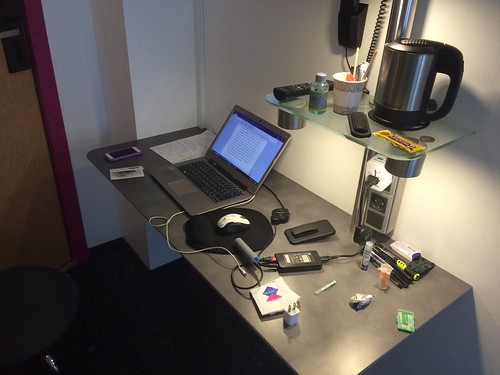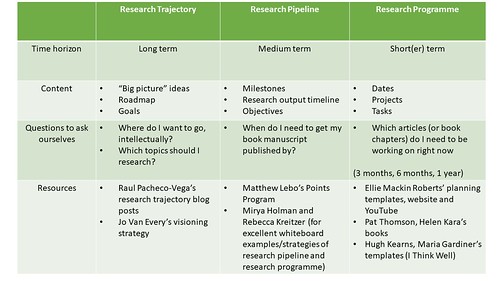A few days ago, I saw a post in a discussion forum on how to write a Research Trajectory document. The conversation that ensued prompted me to consider how *I* viewed the different documents that we produce not only for job-seeking purposes (the Research Programme) but also for advancement reasons (the Research Trajectory), and for our daily, weekly, monthly and yearly planning (the Research Pipeline).
Other people may see these documents differently, but this is how I have conceptualized the differences, however subtle. The table below gives an idea of how I conceptualize them.
A Research Trajectory, in my view, is the conceptual part, where you draw connections between what you started researching, and how your thinking has evolved throughout the years.
To me, a Research Pipeline is the sequence of publications and projects you have planned, and what you’ve already gotten out, and it has a sequential feel to it, much like a Gantt Chart. In my conceptual model, the Research Pipeline is fed by the Research Trajectory, which is more “macro”, large scale.
For example, let’s look at my own Research Trajectory. I started doing research on how we could apply Integrated Assessment (a tool normally used to understand climate change) to questions of industrial restructuring of inter-linked industries in geographically-close locations under multiple stressors. That was my PhD dissertation.
I have always been driven by questions of collaboration. What makes agents collaborate to properly manage resources? So my next research project after the PhD was focused on how to collaboratively govern wastewater (remember my conversation with the Ostroms?).
Once I got a better understanding of how wastewater was governed, I moved towards a different medium (solid waste). And then I moved to bottled water, its governance and politics. To me, you can understand a researcher’s maturation/evolutionary process by looking at their research trajectory.
I’m going to give another example. Say that for your PhD thesis you worked on the history of water in Aguascalientes. And your first book project, based on the dissertation, will be on the history of water in Aguascalientes over the first period (1880-1920). You could very well design a research trajectory that moves you to say, the history of waste governance in Aguascalientes, same period.
That’s probably going to take you at least 3 years to learn the literature, do the archival research necessary, etc. So your Research Pipeline may have a couple of articles from where you can then spin off your second book, the first one coming out on year 4 and the second one coming out on year 5, and then you can have the full manuscript, say by year 6 or 7. In my view, you’re moving historiographically from studying the history of resource governance across media, though you could also switch time periods, or cities, or do comparisons across time periods AND cities AND countries.
And then there’s the Research Program, which I see as a much shorter frame document where you say, “ok, to move into the politics of hazardous waste, I need to start doing fieldwork in a different city/country” and you establish the steps (per year/bi-annually) to get there.
So, my Research Program for the next 24 months involves
– Getting my book out on the politics of sanitation
– Writing up all the fieldwork from my waste pickers project
– Getting some more work done on the politics of bottled water.
(obviously surviving COVID-19, because yes that is also in my plans!)
To recap. In MY view (hopefully other people will agree)
- Research Trajectory: big picture, topics, evolution of thinking, which new questions I want to investigate.
- Research Pipeline: the timed, scheduled, planned outline of which articles, books, book chapters, papers you’re going to get done by when to achieve the goals you set in your Research Trajectory.
- Research Program: shorter term plan of work to get done within a specific time-frame.
In sum: You feed your Research Program (Programme for us Canadians) off your Research Pipeline, which you create based on your Research Trajectory.
Hopefully this conceptualization will help fellow scholars develop their own documents!



Thanks for the explanation